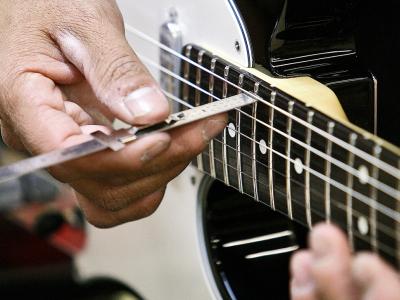What does an Instrument Repair Technician do?
The National Association of Professional Band Instrument Repair Technicians sums up the job this way: "A repair tech is a problem-solver, mechanic, acoustician, plumber, musician, bodyworker, innovator, painter, jeweler, tool and die maker, electroplater, counselor, buffer, chemist, designer, carpenter, and machine tool operator all in one." In other words, an instrument repair technician is a multiskilled and highly trained craftsperson with a variety of complex concerns far beyond simply replacing damaged parts. Instrument repair techs are expert at assessing an instrument's problems, recommending a realistic repair based on the instrument's age, condition, and quality, and performing the necessary work—whether it's a minor tweak or a major overhaul.
Most instrument repair technicians are also skilled players, intimately familiar with the instruments they repair.
In addition to their practical repair duties, technicians also educate and advise customers about caring for and maintaining their instruments. Those who cater to professionals often perform special modifications and services to customize an instrument to meet a particular musician's preferences and needs. Perhaps unsurprisingly, most instrument repair technicians are also skilled players, intimately familiar with the instruments they repair. Because instrument repair techniques are highly complex and not necessarily transferable, most instrument repair technicians specialize in one type or category of instruments, such as strings, brass and woodwinds, or electric guitars and basses. A notable exception to this rule can be found in the field of concert and touring instrument repair and maintenance. While still specialized, touring instrument techs are largely valued for their familiarity with many types of instrument, which aids in reducing touring personnel costs.
At a Glance
Most instrument repair technicians attend instrument repair school or study instrument repair as part of their music education, although some are self-taught. Before beginning their own professional careers, aspiring instrument repair techs might apprentice with a more experienced and established tech. From there, they might start their own business making, repairing, and/or selling instruments, find employment in the repair section of a larger music shop, or go on tour with artists as touring instrument techs. Those who take a freelance approach to the career might combine stints on tour with consistent work maintaining the instruments owned by local recording studios, for example, or occasional gigs as a piano tuner. The most successful instrument repair techs might gain the exclusive business of prominent clients, or shift into the field of making instruments.
Instrument repair technicians often find jobs at music stores or instrument repair shops, or work as independent contractors out of their homes. They may also go on tour with bands or artists as instrument techs. In order to find consistent work as an instrument repair technician, it is important to network with musicians, acquire strong references, and build a great reputation. One should never forget that it takes a great deal of trust for professional musicians to hand their instruments over to a stranger; this is why building a solid clientele takes not just skill, but time, consistency, and a genuine ability to make interpersonal connections.
- Instruments
- Mechanical aptitude
- Hand coordination
- Carpentry
- Engineering
Instrument repair is precise, solitary work. It's important to have the capacity to focus intently on one task and work alone for long stretches of time. Communication skills are also vital, both for pinning down customers' specifications and building long-term relationships with clients.
Instrument repair technicians usually work conventional business hours, with evenings and weekends free—an excellent schedule for those who also perform music on the side. Touring, on the other hand, generally means highly irregular hours and long periods of travel.








